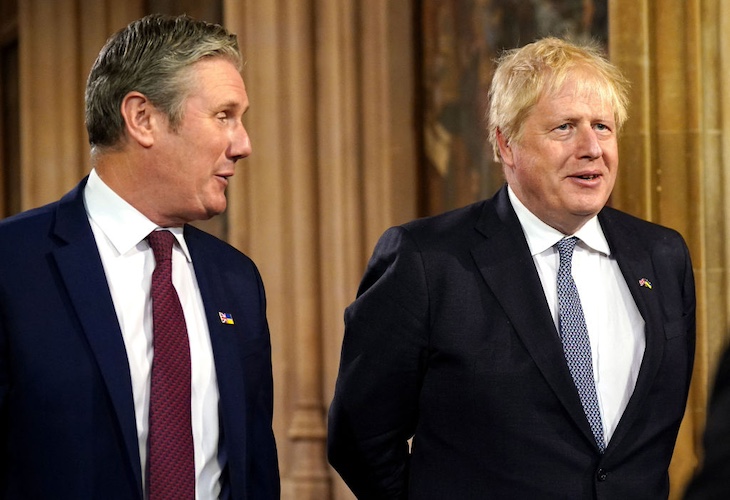Keir Starmer is just the latest in a long line of prime ministers who says that immigration has been far too high in the past and needs to be greatly reduced.
He berates Tory leader Kemi Badenoch constantly on this point, pledging to get a grip on migration volumes and accusing the Conservatives of having presided over a ‘reckless, one nation experiment in open borders.’
It’s a wounding blow to which Badenoch is yet to devise an effective answer. And let’s face it, being outflanked on migration scepticism by Starmer, a man who once declared that ‘a racist undercurrent… permeates all immigration law’, ought to hurt.
Yet now Starmer himself appears destined to fall victim to what we might call the ‘Boris Fallacy’ on immigration, in honour of the disastrous blond bombshell. This fallacy is the idea that while immigration in general needs to be reduced the state is nonetheless justified in sanctioning lots of exemptions to this rule for particular migratory streams.
For Johnson those exemptions included special uncapped schemes for Ukrainians and Hong Kongers, another big scheme for Afghans, the lowering of earnings thresholds for workers – especially in the care sector – and relaxations of limits to bringing in dependants for both workers and students.
All of these were judged to be sufficiently in the national interest on humanitarian or economic grounds to be waved through despite a manifesto pledge that ‘overall numbers will come down’. Perhaps the idea was that the pledge could be honoured by clamping down on immigration volumes in unspecified other areas?
Yet so many exemptions were granted that overall volumes did not decline, as promised, but almost quadrupled, with disastrous political consequences for the Tories.
Which is why, upon learning that Keir Starmer is ready to agree a youth mobility scheme with the EU, I feel like standing up and declaring: ‘I have seen this movie before and I know how it ends!’
Seemingly well-sourced leaks suggest that Starmer is prepared to agree a capped mobility scheme with the EU which could see perhaps 70,000 people between the ages of 18 and 30 come to the UK each year on two-year or possibly four-year visas. A reciprocal agreement would see the resumption of Britain being able to send battalions of young Tobies and Antonias out into the EU. This would certainly revitalise the lost art of dinner party boasting about offspring exploits on the part of smug middle-class parents. No wonder Lib Dems everywhere are beside themselves with delight.
According to polling, this policy is going to be popular with the British public all-round. More in Common found last August that 58 per cent of people thought a youth mobility scheme with the EU would be a good idea and only 10 per cent a bad idea.
Whether or not this turns out to be the thin end of the wedge for a wholesale return to freedom of movement, it is incontestable that it represents a loosening of immigration control – just as Starmer’s recent unqualified guarantee that Britain will never leave the ECHR under his premiership closes off any realistic notion of deterring illegal immigration.
Soon Business Secretary Jonathan Reynolds is going to come under huge pressure from the Indian government to relax visa requirements for their citizens in order to secure a lucrative trade deal between our two countries. You can already hear the mandarinate extolling the idea: ‘This is absolutely vital for growth, Prime Minister.’
So here we are again: a government committed to reducing immigration in general and in the abstract but always persuadable that relaxations are in order when any particular migratory flow comes under the microscope.
Perhaps in each case there will be polling data purporting to show the public is onside with each liberalisation. But when you add all the exemptions together and find that net migration is still running at over half a million a year, just don’t expect to be popular then, Prime Minister. Because you won’t be.








Comments